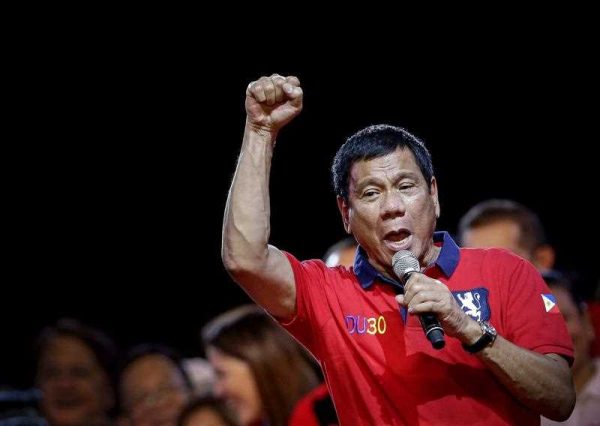Duterte promised a ‘metamorphosis’ and committed to behaviour ‘more in keeping with the dignity of the office’ after his brashness and contempt for formalities leading up to the election. He delivered on this on the day of his inauguration, reading a short yet powerful speech off a teleprompter and meeting with diplomats including those whose countries he had offended during the campaign.
His inaugural address sought to reassure the public that his ‘unorthodox’ methods of fighting criminality are based on an uncompromising adherence to due process and the rule of law. As a lawyer and former prosecutor, Duterte claimed he understood the limits of presidential power. He declared that the contracts the private sector had forged with the Aquino government will be honoured. And he assured the global community that the Philippines will stand by all treaties and international obligations.
Yet the much vaunted metamorphosis seemed to apply only to the most formal of functions. Duterte regained his notorious tough-talking demeanour while addressing members of the Philippine National Police and Armed Forces of the Philippines, warning drug lords ‘there is time to rest and to die’. He publicly named five top police officials allegedly involved in the illegal drugs trade.
Duterte’s perceived authenticity is what has made him popular to constituencies frustrated with the slow moving justice system and enticed by a leader with a track record of delivering campaign promises, even if they involve the use of threats and humiliation.
To begin the business of governance and deliver on the promise of change is at the centre of Duterte’s message. Even before the Duterte administration formally assumed office his cabinet had already established relationships with two competing interest groups in the country: the business community and the Philippine left.
Ten days before the inauguration the economic cluster of the cabinet convened a two-day consultative economic summit with 300 business leaders to explain the administration’s 10-point economic agenda and appease concerned businesspeople.
Duterte also made progress reviving peace talks with the Maoist National Democratic Front of the Philippines (NDFP) by engaging in a two-day exploratory talk in Norway even before he formally assumed office. He appointed NDFP nominees in key cabinet positions that are responsible for agrarian reform, the anti-poverty commission and social services. His administration may yet end one of the longest running Maoist insurgencies in the world.
Duterte’s promise of change both in the short and long term also found support in the legislature within the first 48 hours of his presidency. Bills filed include one that seeks to return the death penalty, in line with Duterte’s strong stance on punishing drug offenders. Hours after Duterte’s inauguration hundreds of drug users were reported to have surrendered to local police all over the country.
The Senate President Franklin Drilon filed a Transportation Crisis Bill to give the president emergency powers to respond to urban public transport and traffic crises by speeding up the procurement of infrastructure and transportation projects.
House resolutions were also filed in the Congress calling for a constitutional convention to replace the constituent assembly in constitutional amendment processes, and to begin the shift to a federal form of government. Duterte has been vocal in his preference for a constitutional convention, as it is more participatory and inclusive than the existing process.
The shape the federal system of government will take remains to be sketched out, although the general contours have been proposed by some of Duterte’s allies. Compared to previous administrations, there is strong momentum for a constitutional change to take place under Duterte’s widely popular administration.
There are three issues worth monitoring in the coming months.
The first is the extent to which Duterte’s administration interprets the boundaries of legal conduct. Integral to the narrative of Duterte’s first week in office are reports of dozens of suspected drug traffickers killed in police encounters and drug users subject to summary execution. This is a cause for alarm not only through the lens of human rights but from the perspective of institutional reforms in the security sector, the justice system and healthcare — the problem of drug addiction and rehabilitation is, after all, a health issue.
Penal populism is the term sociologists use to refer to situations where the discourse of toughness and the public demand for immediate results are given priority over long-term strategies of building effective institutions. To date, no country in the world can claim victory in the war on drugs. And often these wars come at a high cost.
The second issue relates to Duterte’s relationship to the Marcoses. This year marks the 30th anniversary of the People Power Revolution that ousted the dictator Ferdinand Marcos from power. The dictator’s son, Ferdinand ‘Bongbong’ Marcos Jr claims to have the president’s ear with regards to the burial of the dictator Ferdinand Marcos in the National Heroes’ Cemetery. Ferdinand ‘Bongbong’ Marcos Jr may also be in the running for a cabinet position after he serves the year-long ban on government appointments imposed on candidates who ran in the recent elections.
Finally the state of Duterte’s opposition will be critical in ensuring that Philippine democracy withstands tendencies towards tyranny. Duterte was quick to form a supermajority in the House of Representatives and has forged broad alliances with various movements and personalities across ideological divides. But it will also be crucial to maintain a healthy opposition. A reasonable political opposition, empowered Commission on Human Rights, independent judiciary and vibrant citizenry are all necessary to not only maintain checks and balances but also generate meaningful debates on the best way forward for the Philippines.
‘The ride will be rough,’ Duterte admitted in his inaugural address. It is up to the public how they choose to be part of the journey.
Nicole Curato is a research fellow at the Centre for Deliberative Democracy and Global Governance at the University of Canberra. Follow her on Twitter @NicoleCurato.

